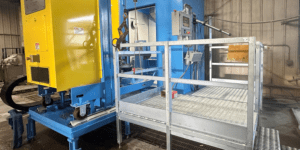MAKE OR BRAKE
Talk about a competitive edge. SolidCAM CAD/CAM software enables Alcon Components to perform continuous 5-axis machining on more complex 3D surfaces, produce more of a part in one operation, and convert design ideas into functional metal components more rapidly than ever before.
Posted: December 5, 2011
Talk about a competitive edge. Advanced CAD/CAM software enables this manufacturer to perform continuous 5-axis machining on more complex 3D surfaces, produce more of a part in one operation, and convert design ideas into functional metal components more rapidly than ever before.
From its headquarters in Tamworth, UK, Alcon Components Ltd. has been designing and manufacturing advanced brake and clutch products since 1984, when John Moore founded the company to supply brakes for Audi Sport’s Group B Quattro rally cars. Now the company has a worldwide reputation in the motorsport industry, supplying brake components for the World Rally Championship and, in the U.S., for NASCAR and IRL teams. The firm also manufactures braking equipment for high performance road cars and for special vehicles used in defense applications.
This manufacturer is adept at delivering products that meet the requirements of mainstream OEMs and is experiencing rapidly growing demand for its capabilities. Its engineers thrive on the challenge of devising innovative and unusual solutions. The company employs over 80 staff at its headquarters and has sales offices in the U.S. and France to ensure its international presence. Furthermore, it is certified to the internationally recognised ISO TS16949 Quality Standard required by the automotive industry.
Alcon customers require not only the highest precision and machining quality, but also manufacturing flexibility and short response times. The ability to respond to these demands is the key to the manufacturer’s success. At its headquarters many of the production functions are under one roof, enabling it to maintain maximum control over quality and scheduling – an essential aspect of its ‘rapid response’ approach. The ability to machine, finish, assemble and test components in-house is often crucial to meeting customer deadlines.
Allan Ford, a senior production engineer who has been with the company for nearly 20 years, says, “I have seen us grow from 8 to more than 80 employees. The main reason for our success is our flexibility and ability to convert design ideas into metal as fast as possible.” Their engineers are equipped with state-of-the art CAD/CAM software and profits are constantly being reinvested in capital equipment, including new CNC machining centers, computer-controlled inspection equipment, and specialist tooling systems.
The engineers work in close collaboration with customers, seeding their ideas and developing them to create a complete manufacturing process and finished product. This requires a 3D CAD system that can easily import the different CAD formats supplied by customers and which has powerful 3D modelling capabilities to modify and create geometry.
Alcon has used SolidWorks 3D CAD for several years and is equipped with six seats. Ford says, “For us, this versatile software tool accelerates our design process. For example, weight is always an issue in motorsport and we are permanently investigating ways of reducing it while maintaining part stability. For this we need an easy-to-use and powerful CAD system that also supports integrated analysis tools. Moreover, we use SolidWorks in the manufacturing department to design fixtures for locating and clamping the workpieces on the machine tools.”
Alcon replaced its existing CAM system with two seats of SolidCAM + SolidWorks in 2004. SolidCAM is especially designed for the shop floor to support 2.5D milling, 3D milling, high-speed machining, multi-sided indexial 4/5 axes milling, simultaneous 5 axes milling, turning, mill-turn up to 7 axis and wire EDM.
Bob Luck, a production engineer and CAM programmer, explains that “we analyzed our previous CAD/CAM process chain and identified weaknesses with the lack of integration into SolidWorks. It was sometimes difficult for us to get error-free design data into CAM quickly enough. Furthermore, we had to wait about six months to get a suitable post processor from our old CAM supplier for our Mori Seiki CNC lathe.”
The company evaluated three CAM systems and used four criteria in its selection process: (1) seamless integration with SolidWorks, (2) a broad range of CAM functionality, (3) powerful post processor capabilities, and (4) excellent UK support. Alcon carried out trials on each shortlisted system for one month before making its decision. Luck says, “Our approach gave us the opportunity to test both the software functionality, and the underlying support organization. For us, excellent local support is absolutely vital. We discovered that SolidCAM reduced our NC programming time by half, and we have been pleased with the ease of use and power of the 2.5D machining module. A major benefit for us has been the quality of the UK support.”
Since the installation of this system, Alcon products have become more sophisticated, with the use of sculptured 3D surfaces in the design. “Our designers have been able to take advantage of the more complex shapes we can now manufacture,” notes Luck. “Initially, we were using just 5-axis positioning for 3+2 machining. Now, thanks to our new capabilities, we can achieve continuous 5-axis machining on complex 3D surfaces. This enables us to produce more of the part in one operation, and machine far more complex geometry than we could previously achieve which, in turn, improves the form and function of our products.”
As well as 5-axis machining, the company now uses SolidCAM to program its Hitachi Seiki Hi-Cell mill-turn centers to produce parts such as master cylinders. “On our previous CAD/CAM system, we had to substantially edit the G-codes to make the program operate. Now the post processor produces perfect NC code, making it far simpler and quicker to produce a new CAM program.”
The collaboration between Alcon and SolidCAM is a continuing process that Luck contributes to the software development program and advanced technical support from SolidCAM. “As our expertise has increased, so the benefits we have gained from using SolidCAM have grown,” smiles Luck. “Since we started using the software, our greater programming skill levels have enabled us to reduce the cycle times on our products by another 20 percent. Although most of our products are unique, we have been reprogramming some long running components and have achieved some substantial savings in manufacturing times – up to 40 percent in some cases – making the exercise very worthwhile.”
Gordon Drysdale, the managing director of SolidCAM UK notes that “their requirements have evolved considerably since we first started working with them. Our new versions of software have delivered powerful new functionality at each release, keeping them ahead of the competition by producing improvements in technology, productivity, and quality. Our goal is to go further by providing the best training, support and methodology working closely with Alcon to scrutinize their processes and extract the full potential of mutual collaboration.”
The two collaborators are currently evaluating the benefits of using 5-axis machining principles on components which could normally be cut in 3-axis. “The on-going partnership is working well, the support is excellent and we are now able to make parts which would have been impossible for us to manufacture before,” says Luck. “We make our systems work very hard, and we are looking forward to trying their new iMachining™ module which, we hope, will improve our productivity even more.”
Alcon Components Limited, Apollo, Lichfield Road Industrial Estate, Tamworth, Staffordshire, United Kingdom, B79 7TN, +44 (0)1827 723 700, Fax: +44 (0)1827 723701, [email protected], www.alcon.co.uk.
SolidCAM UK Ltd., BBIC, Innovation Way, Barnsley, South Yorkshire, United Kingdom S75 1JL, +44 (0)1226 241 744, [email protected], www.solidcam.com.














